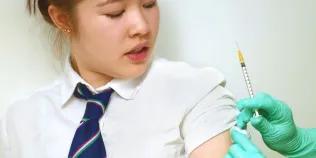The vaccine continues to be effective more than 12 years after it was given, in women who came forward for cervical screening, experts say.
Previous studies have shown that the jab is highly effective in preventing the development of cervical pre-cancer and cancer.
The vaccine provides protection when administered to girls aged 18 years or under – an older age than previously reported from Scotland – with the biggest reduction in cervical pre-cancer seen in girls vaccinated at age 12-13.
Population data
HPV is a common virus, usually spread through sexual contact, and responsible for almost all cases of cervical cancer – the fourth-most common cause of cancer in women worldwide.
Scotland’s routine cervical cancer screening programme and the HPV immunisation programme, introduced in 2008, work together to both reduce the prevalence of HPV and the development of cervical pre-cancer and cancer among women.
Scientists at the Universities of Edinburgh and Strathclyde and Public Health Scotland used population health data from across Scotland to track the long-term effectiveness of the vaccine.
Herd immunity
They found women from Scotland’s most deprived areas, who are at greater risk of cervical pre-cancer and are less likely to attend screening appointments, benefited the most from vaccination, helping to reduce health inequalities.
Strong community protection may also contribute to reductions in cervical disease among women in more deprived areas where vaccine uptake is lower, experts say.
Routine vaccine
The HPV vaccine is offered as a routine immunisation through schools to all S1 pupils in Scotland.
It also helps to protect both boys and girls from other HPV-related cancers that can develop later in life, such as some head and neck cancers, other anogenital cancers as well as genital warts.


